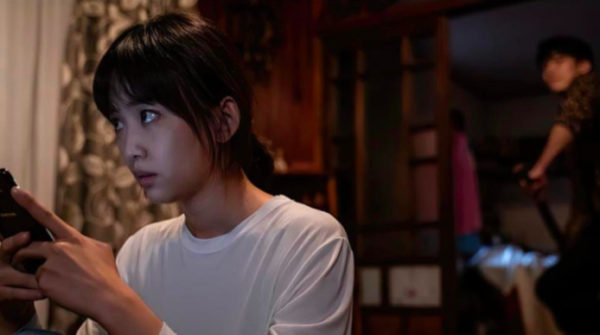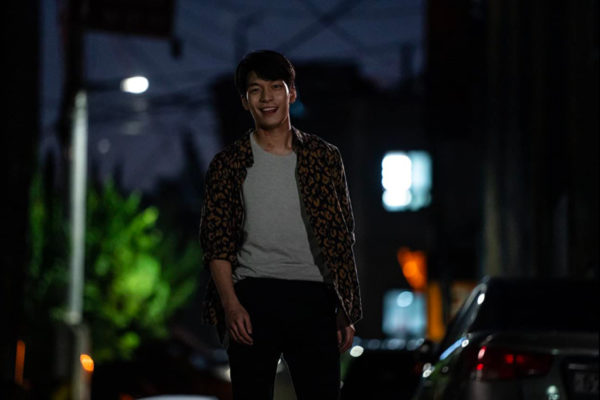
I’ve always been fond of women in peril films, particularly when they put a unique spin on the subgenre.
In Kwon Oh-seung’s Midnight (2021), Do-sik (Wi Ha-Joon), a violent serial killer targets a deaf woman, Kyung-mi (Ki-joo Jin), after she finds one of his victims, So-jung (Kim Hye-Yoon), in an alley. What follows is an epic cat and mouse chase over the course of a single night; a thrilling shot of adrenaline with frequent gasp out loud moments from start to finish.
Midnight races out of the gates and never lets up. After a cold open that outlines Do-sik’s modus operandi – luring vulnerable women into his neon-lit van to murder them – we’re introduced to Kyung-mi at work, answering customer service calls. The scene immediately confirms her hearing-impaired status, but also showcases her strong personality when she hilariously swears in sign language at a customer. She may be cute and petite, but she’s no wallflower.
The relationship that Kyung-mi has with her mother (Hae-yeon Kil), who is also hearing-impaired, is the emotional core of the film. The cash-strapped pair are saving up for a vacation, which is the topic of discussion that Kwon uses to both establish character and various tools and techniques that Kyung-mi and her mother utilize to navigate the world. These include ample use of lip reading, cell phone texts and sound bars to help register the sound of oncoming traffic (a recurring motif is the danger of not being able to hear vehicles on the road).
After dropping off her mother en route back to the car, Kyung-mi comes across So-jung in a deserted alley. The issue is that not only is Kyung-mi unable to call for help, but Do-sik, lurking nearby, sees her and promptly begins to stalk her – first in a thrilling parking garage sequence, then to the police station and, finally, into the heart of the deserted neighbourhood where she lives.

Unlike North American thrillers cut from the same fabric, the characters in Midnight catch onto their precarious situation very quickly. While there is an extended bit in the police station where Do-sik pretends to be So-jung’s brother to continue to gain access to Kyung-mi and her mother, the killer’s narcissistic inability to resist teasing and threatening ensures that mother and daughter, as well as So-jung’s real brother Choi Jong-Tak (Park Hoon) quickly learn who he is. While the police are presented as dunces who are incapable of assistance, by casting aside the “whodunnit” aspect, Midnight focuses on the visceral thrills of the chase.
The propulsive, relentless forward momentum of the film is where Kwon’s film shines. The mostly stripped down narrative is primarily in service to a series of thrilling set pieces in environments both closed (Kyung-mi’s apartment), open (the deserted gentrified streets of her poor neighbourhood) and public (the highly populated downtown core of the climax). And while each separate encounter introduces a different kind of threat or an escalation of the stakes, it is the way that Kwon shoots the film that gives it so much energy. The film is forever on the move, with both Do-sik, Kyung-mi and Jong-Tak spending the majority of the back half on the run, in pursuit of each other. Kwon matches his characters movements with the camera, dollying alongside players at dizzying speed as they race along, through and past the frame; the effect is such that the audience isn’t simply watching, but is actually a part of the frenetic chase. It’s an adrenaline shot straight to the heart.
Of course no amount of energy would satisfy if we were not invested in the characters. Despite the relatively threadbare plot (justified since everything takes place over a single night), the cast is doing exceptional work bringing the characters to life. While Ki-joo has arguably the toughest role because she has to convey everything silently, Kyung-mi is never a damsel in distress (a problem with disabled heroines in thrillers). A lot of Midnight’s tension and dread revolves around the character’s disability, but Ki-joo ensures that Kyung-mi is vulnerable, strong, smart and self-sufficient, particularly in the back half of the film.
The true star of the film, however, has got to be Wi Ha-jun. The baby faced actor is disarmingly attractive and innocent-looking, but his transformation on screen is remarkable. Do-sik is legitimately terrifying, but the character is most memorable when Ha-jun is delivering callous, mocking commentary under his breath, particularly when Do-sik is “undercover” as So-jung’s brother at the police station. It’s a perfectly calibrated performance that’s highly memorable.
The Bottom Line: Midnight is a white knuckle thrill ride with great central performances by Wi Ha-jun and Jin Ki-joo and propulsive, dynamic direction by first time feature director Kwon Oh-seung. Strap in! 4/5